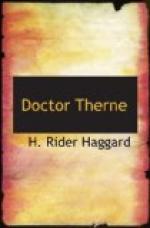From all these circumstances it might have been supposed that my case was hopeless, especially as no Radical had even ventured to contest the seat in the last two elections. But, in fact, this was not so, for in Dunchester there existed a large body of voters, many of them employed in shoe-making factories, who were almost socialistic in their views. These men, spending their days in some hive of machinery, and their nights in squalid tenements built in dreary rows, which in cities such people are doomed to inhabit, were very bitter against the upper classes, and indeed against all who lived in decent comfort.
This was not to be marvelled at, for what can be expected of folk whose lot, hard as it is, has none of the mitigations that lighten the troubles of those who live in the country, and who can at least breathe the free air and enjoy the beauties that are common to all? Here, at Dunchester, their pleasures consisted for the most part in a dog fight or some such refining spectacle, varied by an occasional “boose” at the public-house, or, in the case of those who chanced to be more intellectually inclined, by attending lectures where Socialism and other advanced doctrines were preached. As was but natural, this class might be relied upon almost to a man to vote for the party which promised to better their lot, rather than for the party which could only recommend them to be contented and to improve themselves. To secure their support it was only necessary to be extravagant of promises and abusive of employers who refused to pay them impossible wages.
Next in importance to these red-hot “forwards” came the phalanx of old-fashioned people who voted Liberal because their fathers had voted Liberal before them. Then there were the electors who used to be Conservative but, being honestly dissatisfied with the Government on account of its foreign policy, or for other reasons, had made up their minds to transfer their allegiance. Also there were the dissenters, who set hatred of the Church above all politics, and made its disendowment and humiliation their watchword. In Dunchester these were active and numerous, a very tower of strength to me, for Stephen Strong was the wealthiest and most important of them.
During the first day or two of the canvass, however, a careful estimate of our electoral strength showed it to be several hundred votes short of that of our opponents. Therefore, if we would win, we must make converts by appealing to the prejudices of members of the electorate who were of Conservative views; in other words, by preaching “fads.”
Of these there were many, all useful to the candidate of pliant mind, such as the total drink-prohibition fad, the anti-dog-muzzling fad, and others, each of which was worth some votes. Even the Peculiar People, a society that makes a religion of killing helpless children by refusing them medical aid when they are ill, were good for ten or twelve. Here, however, I drew the line, for when asking whether I would support a bill relieving them from all liability to criminal prosecution in the event of the death of their victims, I absolutely declined to give any such undertaking.




